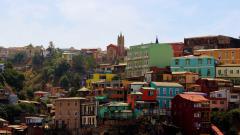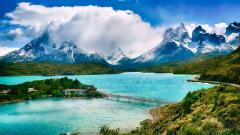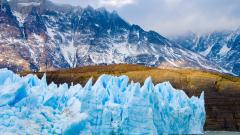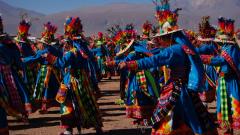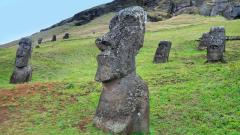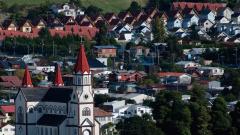 travel to Chile
travel to Chile
Chile is in the south of South America, extending along the Andes. It limits to the north with Peru, to the east with Bolivia and Argentina, and to the west with the Pacific Ocean. It also has its surface on the continent Sala y Gómez Island, the Juan Fernández Archipelago, and Easter Island.
Chile is a country that has many different nuances: the Chilean Patagonia, located in the south of the country and where we can find giant glaciers and fjords at the foot of the mountains; lakes and rivers to navigate and numerous volcanoes; and the Atacama Desert located in northern Chile, an immense wasteland classified as the driest desert on the planet.
It is a place highly recommended for those visitors in search of outdoor adventures and activities and want to enjoy the great natural wealth. Chile offers many national parks and nature reserves where we can contemplate the wonders of nature while we travel the untamed land or sail its warm and calm waters. Many of these experiences can be experienced in the Rapa Nui National Park within the remote Easter Island, where we can see the iconic Easter heads. It should be noted that 20% of the total Chilean territory are protected areas.
Besides nature, Chile is culture and tradition. At present, archaeological remains belonging to the indigenous peoples who inhabited the land for centuries are in good condition. Discover the geoglyphs of Chug Chug in the Atacama Desert and the Chichorro mummies culture in the Arica region.
Currently, there are still small indigenous communities which preserve their ancestral customs. The Mapuche people that live near Budi Lake, the Altiplano town in the north of the country and the Rapa Nui culture of Easter Island will invite you to taste their best delicacies and share their crafts and ancient history.
Chile has several tourist resources denominated World Heritage by UNESCO: the Historic District of Valparaíso, located on the central Pacific coast, is an urban centre that represented a nucleus of development and very important growth in Latin America during the nineteenth century; the road systems of the Qhapaq Ñan are another vestige inherited by the Incas and that are shared with Bolivia, Colombia, Ecuador, Peru and Argentina; the churches of Chiloé are the oldest wooden constructions that are still preserved and whose origins date back to the seventeenth century during the process of evangelization in the New World.
The capital Santiago de Chile is an example of modernity, which offers abundant leisure activities for those visitors who decide to go through its streets with cosmopolitan tints and at the same time from the colonial era, enjoy the museums of art and history, and restaurants and bars to taste the delicacies of Chilean cuisine. You can also contemplate from the top of Cerro de San Cristóbal the spectacular skyline of the city while tasting a “mote con huesillo”, a typical Chilean drink.
REQUIRED DOCUMENTATION
To enter Chile, you must show your identity document or passport, and a visa if you come from certain countries. Citizens who come from Argentina, Bolivia, Colombia, Ecuador, Brazil, Peru, Paraguay and Uruguay may enter the country with their equivalent identity documents.
Passengers from Albania, Canada, the United States, Mexico and Australia will have to pay a reciprocity tax upon arrival at the airport.
Citizens from countries that do not have any diplomatic agreement with Chile must present a visa and proof of grant. The authorities must be informed of the reasons for their trip, their duration and the necessary documentation to leave Chile.
Once in Chile you will be given the Tourism Card, a form that you must fill out. This card is personal and non-transferable and must be kept until you leave the country. In case of losing the card, you will have to pay a fine.
For more information, you can consult the following address: http://minrel.gob.cl/minrel/site/artic/20080619/pags/20080619154047.html
EMBASSIES AND CONSULATES: https://www.embassypages.com/chile
PRINCIPAL AIRPORTS OF CHILE
- Comodoro Arturo Merino Benítez International Airport, in Santiago de Chile (Codex SCL)
- Chacalluta International Airport, in Arica (Codex ARI)
- Carriel Sur International Airport, in Talcahuano (Codex CCP)
- Diego Aracena International Airport, in Iquique (Codex IQQ)
- Mataveri International Airport, in Easter Island (Codex IPC)
- El Tepual International Airport, in Puerto Montt (Codex PMC)
- Cerro Moreno International Airport, in Antofagasta (Codex ANF)
- Presidente Carlos Ibáñez del Campo International Airport, in Punta Arenas (Codex PUQ)
practical information
useful information before leaving
Language
Religion
Political regime
Currency
Warnings
Documentation
Vaccines
recommendations
Recommendations before traveling to Chile
SECURITY
Security in the country is quite acceptable, but the most basic measures must be taken, such as keeping your belongings well-guarded in public places.
Avoid walking through marginal neighbourhoods in the peripheries of large cities, such as Santiago de Chile.
Make copies of your identity document and your passport and keep the originals in the hotel safe.
Do not carry large amounts of foreign currency or show objects of great value in public. If you are going to carry out risk activities, do it with the material and with the authorized instructors for its correct development. It is advisable to register at the Consulate General to be located and rescued more quickly in case of accident.
Chile is a country prone to natural catastrophes such as earthquakes, tsunamis, floods and volcanic eruptions. In case of natural disaster, obey the instructions given by the corresponding Chilean authorities and communicate your situation to the Consulate General.
HEALTH
Hire a medical insurance, especially if you intend to perform risk sports.
If you are going to travel to areas such as Patagonia or the Andes, take warm clothes.
It is advisable to use repellents, mosquito nets and comfortable clothes if you intend to travel to Easter Island, since the Chilean authorities confirmed Zika cases. Pregnant women wishing to travel to the island should exercise extreme caution.
It is recommended to use a sunscreen when doing outdoor activities.
CLIMATE AND TEMPERATURES
Its geographic location originated by the latitudinal amplitude, the relief and the oceanic influence make Chile understand a great variety of climates, the largest in the world. It is characterized by warmer temperatures and drier seasons in the north, while in the south the temperature tends to be colder and rainfall is usually more abundant. The central zone of the country has a Mediterranean climate, the seasons are well differentiated.
BUSINESS HOURS
Shops usually open at 10:00 and close at 20:00. The banking entities are open from Monday to Friday from 9:00 am to 2:00 pm, and the exchange offices from Monday to Friday from 9:00 am to 2:00 pm and from 3:00 pm to 6:00 pm.
TIPS
Tipping in Chile is not mandatory, so many restaurants add it to the bill as 10% of the total amount. Even so, it is advisable to leave an extra 10% if the perceived service has been excellent.
ELECTRICITY
The electrical voltage is 220 volts and a frequency of 50 Hz. The types of plug used in Chile are type C and L. See if you need an adapter.
TELEPHONES OF INTEREST
The phone code is +56.
Some telephones of interest are the following: carabineros (133); firefighters (132); ambulance (131).
TIME ZONE
UTC-4.
regions of Chile
Know all the zones and cities that you can discover in your trip

